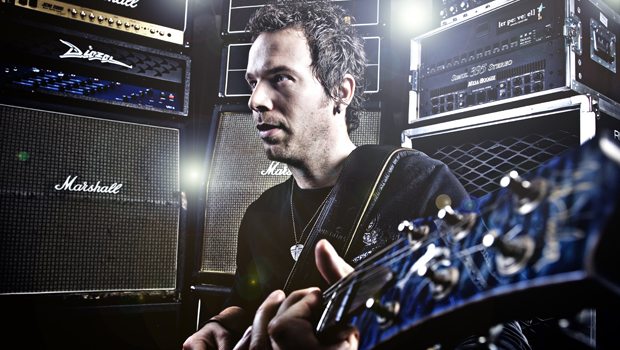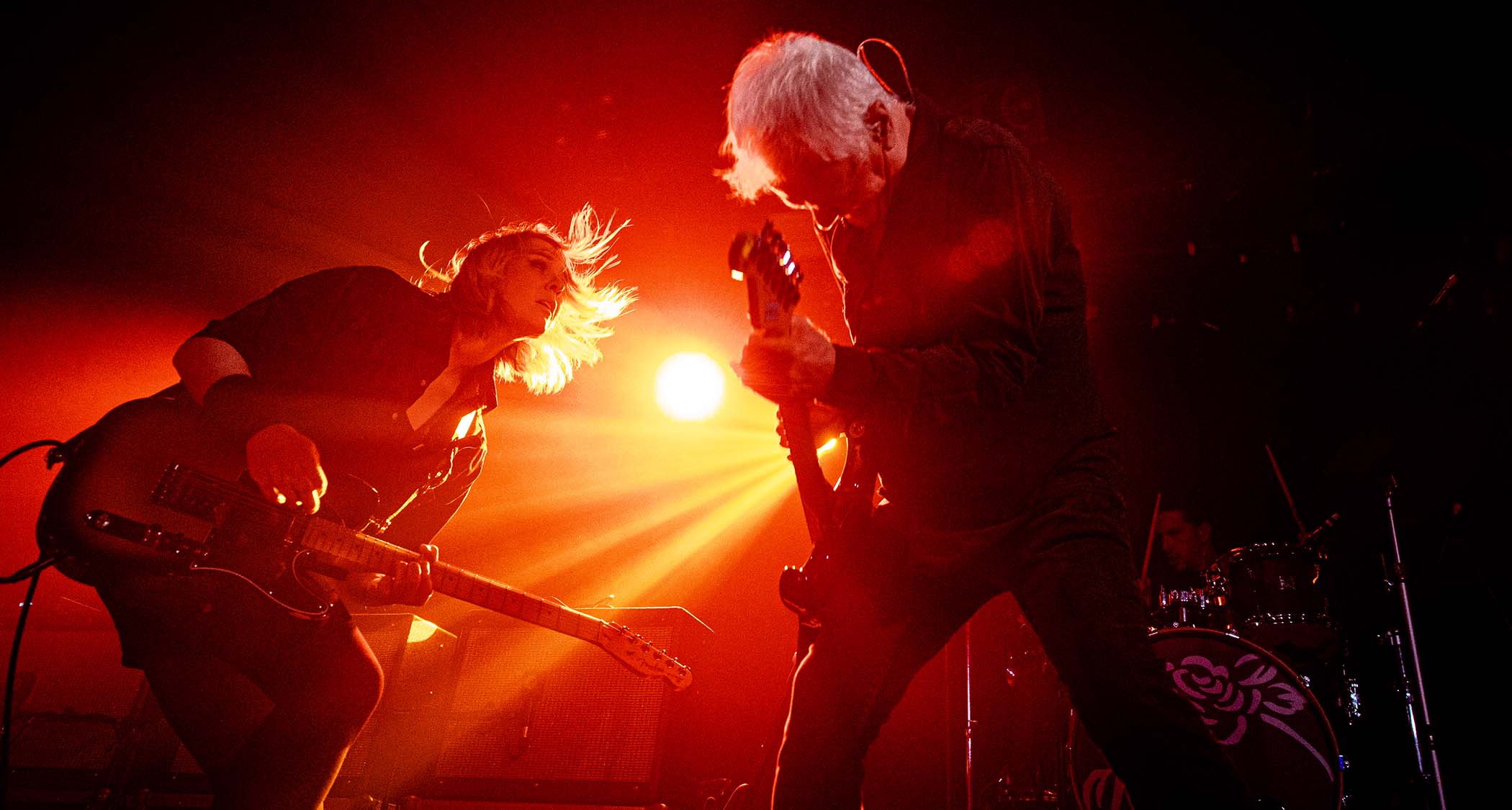All the latest guitar news, interviews, lessons, reviews, deals and more, direct to your inbox!
You are now subscribed
Your newsletter sign-up was successful

It's easy for a band to try and tackle lofty philosophical concepts over the course of an album and come off as pretentious, or even worse, boring.
Thankfully, German art rock band RPWL avoided the pitfalls to which so many of their peers fall victim, delivering an album of orchestrated guitars, soaring melodies, and dense atmospherics that reflect the heady mood of the album.
Beyond Man and Time, which will see release March 13 via Gentle Art of Music, marks the group's first concept album of their 12-year history. Taking cues from the philosophy of 19th-century German philosopher Friedrich Nietzsche — and more specifically his opus magnum, Thus Spoke Zarathustra — the band weave together 11 tracks with a story line featuring a lone character on a journey that ultimately changes his entire way of thinking, making use of ethereal guitars, electronics and a whole pallet of instruments to tell the story.
We recently caught up with RPWL guitarist Kalle Wallner, who filled us in on the process behind Beyond Man and Time.
GUITAR WORLD: What made you guys decide now was the right time to do a concept album?
It was not really planned at first. All of our albums had a kind of one main topic, but not a complete story. We discussed some lyrics and listened to some very rough demos. With this foundation in mind, we thought that this philosophic main idea would be awesome to create a story with all these figures.
Was the idea in place before you began writing songs, or did it emerge out of songs with similar themes?
All the latest guitar news, interviews, lessons, reviews, deals and more, direct to your inbox!
Both happened. With this album, we didn’t make demos of entire songs. We had just melodies or riffs and combined it to some lyric and worked out the song together. Or the other way around: we had the lyrics and tried to catch the mood and atmosphere for the music. This is how we wrote, for example, "The Fisherman."
The idea of using Nietzsche as a starting point is really cool, especially given your nationality. Where do you see his place in Germany's national history?
Nietzsche was a lateral thinker who tried to roll up many social things and aspects of his time in a totally new way. In all his lifetime, he was often criticized about his extreme statements because of his questioning of the value and objectivity of truth. And it doesn’t even particularly refer to Germany; for people in every country, it’s always important to question everything that’s going on.
The limited-edition bonus edition actually sounds like one of the cooler special editions I've heard about in a long time. Talk a bit more about what is included, especially the audiobook.
For us, the story of Beyond Man and Time is very important, so we’d like to give the listeners the opportunity to dive into it. With the spoken words it might be a bit easier than with the songs. The audiobook is in English and German, and both have a duration of about 35 minutes. Also included, you can find a poster with a map to show the trip from figure to figure, from song to song.
The way the clean guitars and keys almost meld together in "We Are What We are" creates a really haunting atmosphere. What guitars and effects are you using here?
In the studio I’m using a lot of different guitars. In this song, the guitars are tracked similar to an orchestra. I used a semi-acoustic Gibson for the lower voicings, a Fender Strat for the warm mids and a Nik Huber Twangmeister for the eighths line on top. Finally there are doubled acoustic guitar chords with a Taylor Koa for the wideness. So there is not modulation on any track, just a bit delay because all guitars work together and make this warm and moody sound.
The combination of electronics/keyboards and acoustic instruments is extremely well done on the album. How did you go about approaching mixing these elements?
We mostly start with the acoustic elements and work with the main riff or backing track while songwriting. In the beginning our songs are very simple, and we concentrate on the main hookline or musical element. In the production, of course, we’re going to accentuate these elements, sometimes in a more acoustic, sometimes in a more electronic way. But we have very good and old analog equipment in our studio and know it very well. Yogi [Lang, vocalist/keyboardist] has loads of old analog synthesizers, and I have many different amps and guitars. So it’s great to work out what’s best for each song.
Talk about the guitars and amps you used across the album.
My main guitars are some Nik Huber Dolphins and a Twangmeister, which have excellent sounds and handling. But I’m also using Strats and Teles and a 1968 Gibson Les Paul Custom for rhythm guitars. For the solos I mostly played a Nik Huber Dolphin or an Tom Anderson Pro Am from 1989, which was my first professional e-guitar. Its sound is still amazing!
I also used a custom-made Sitar guitar and Rickenbacker 12-string. Even if the rhythm guitars are not too heavy I often used a Diezel VH4 and an old single-channel Marshall for them. The clean guitars are from an old Fender Twin Reverb, an old Orange, or sometimes my Mesa/Boogie Triaxis with an 395 Simul Class power-amp. This Triaxis is also the amp for my solo sound. The Leslie guitar is played through a huge Leslie 760. Great sound!
How about your effects arsenal?
My main effect is delay. I love my old TC2290, but I also used a Line6 DLY4. The Line 6 stuff is great; I also did some effects with the MM4 Modulation Pedal and some funny filters with a Filter Pro. You can also hear a Whammy pedal and loads of other gear I already forgot. But I love to try different setups and sounds. Sometime it needs a while to find the right sound, but it’s always with it.
"The Ugliest Man In the World" is one of the more intense tracks thematically on the album. What can you tell me specifically about that song? What is its role in the larger story?
The ugliest man lives without any mask. He is someone who accepts every single aspect of his existence, so has no need to be disgusted or pitiful by his ugliness. In opposite, he has pity for all the people who are so insecure about their own masks that they have lost their sight of the real things in life.
So the guitar riff should give you the impression of a limping, ugly and bad-looking guy. For doubling the guitar riff I used also an octaver. The riff ends up in a kind of instrumental wide and powerful chorus. I used the neck pickup of an old Strat or the delay guitar. The verse is totally different than the aggressive parts in the beginning, because the appearance of the man is deceiving. When he’s talking, all the bad-looking things are gone and there is a friendly man. The organ solo in the middle part reminds me of the '70s and leads to a bridge with lots of energy. I like the songs very much with all their ups and downs.
I hear a lot of post-punk influence in your music. Who would you classify as the band's biggest influences?
I would not classify any influences. Within the band these are too different. The '70s are such a big influence to all what happened later in music. There are many, many important and great albums that were released in the '70s that these relate to every musician. The psychedelic elements from this time can also be heard in many modern bands.
How do you plan to present the album live? Will you be playing all of it together?
Yes. Otherwise, it wouldn’t make sense to split up the album or to sort out single tracks. In opposite we will play the full version of "Somewhere in Between," which unfortunately had to be shortened due to the length of a CD, and maybe one or two more tracks that we didn’t finish for the album. We will also have a show with many different projectors and screens to realize the album visually.
After having to work on a concept album, is this something you could see the band doing again? Was it more difficult than recording a regular album?
That is a very difficult question shortly after we just finished the last album. We’re very happy right now and looking forward to the tour, which will start in April. In the meantime, we realized so many albums that I’m sure we will find a new challenge for RPWL. It was not more difficult to work on a concept album because at every stage of the production, it was clear where it should lead and where it should end. If the idea of an album is so clear, it is just great to find the right way and to see how it is growing.
Josh Hart is a former web producer and staff writer for Guitar World and Guitar Aficionado magazines (2010–2012). He has since pursued writing fiction under various pseudonyms while exploring the technical underpinnings of journalism, now serving as a senior software engineer for The Seattle Times.

